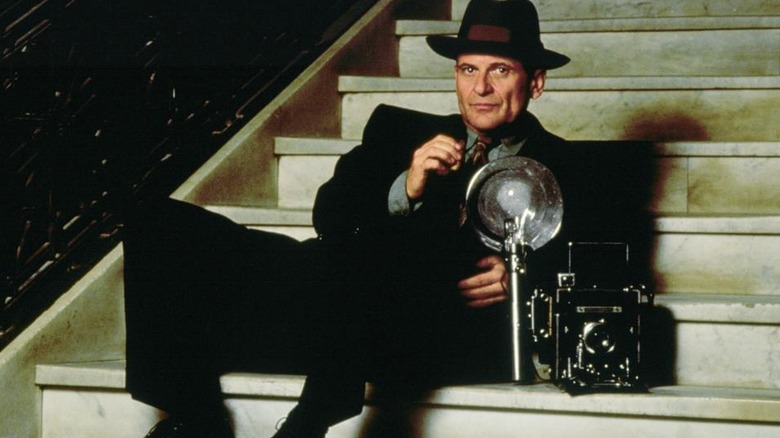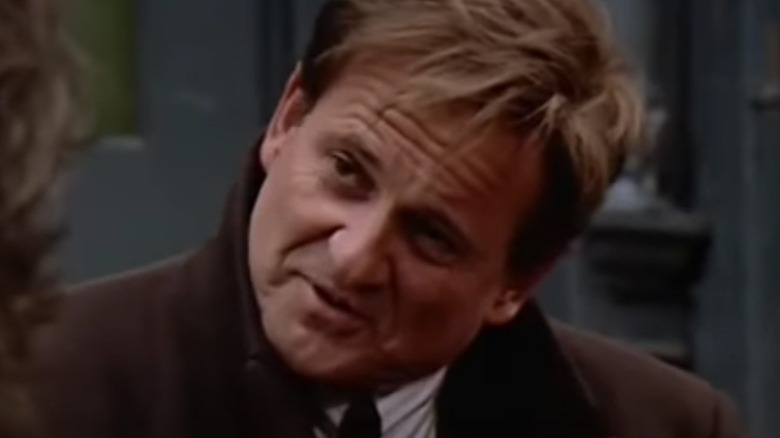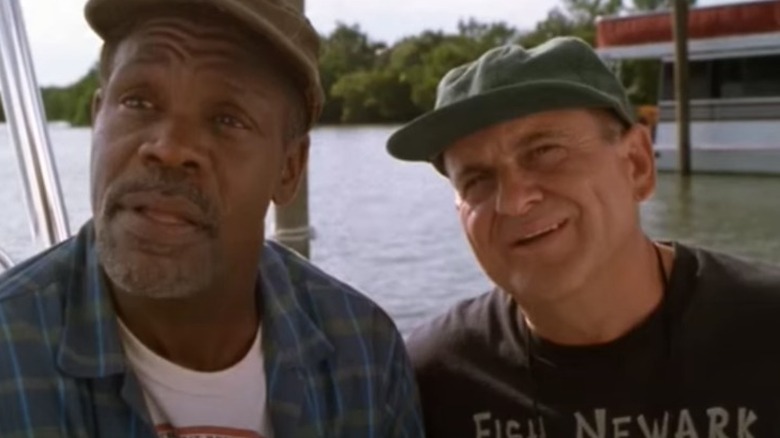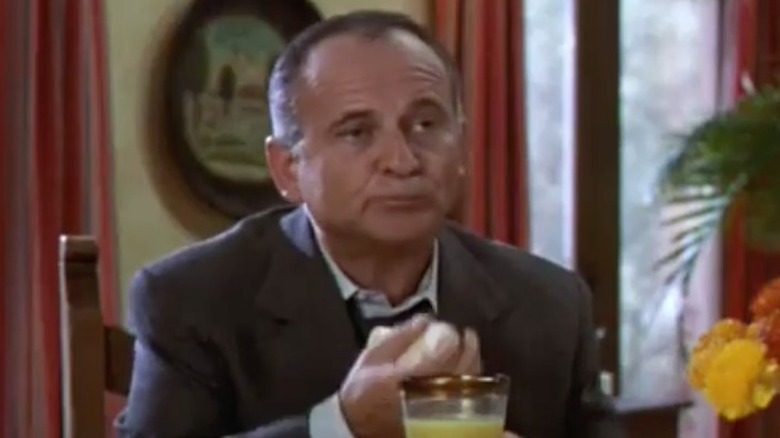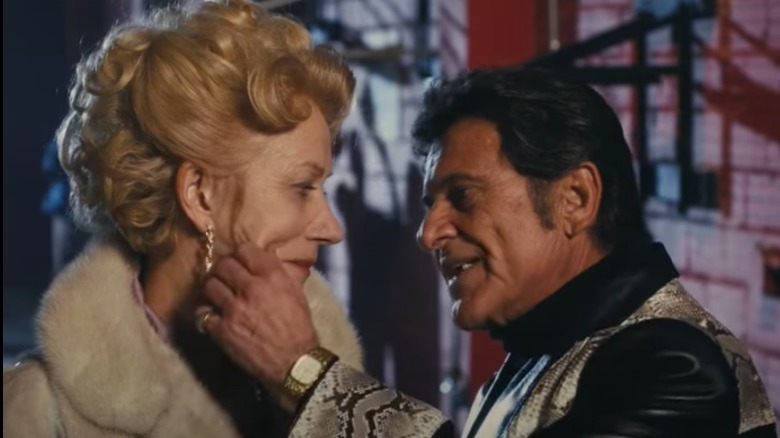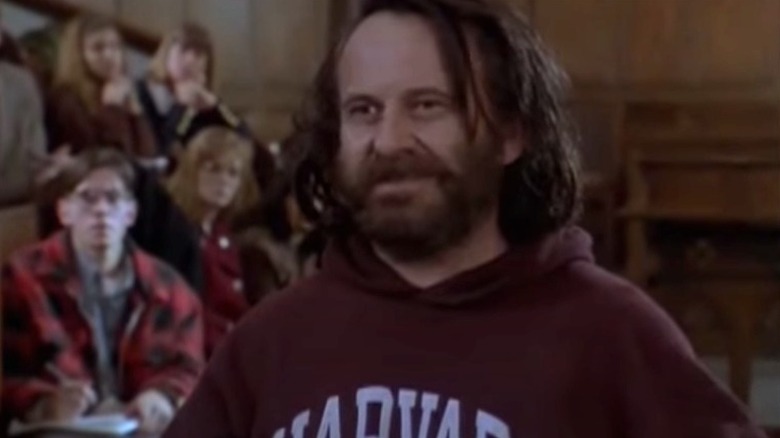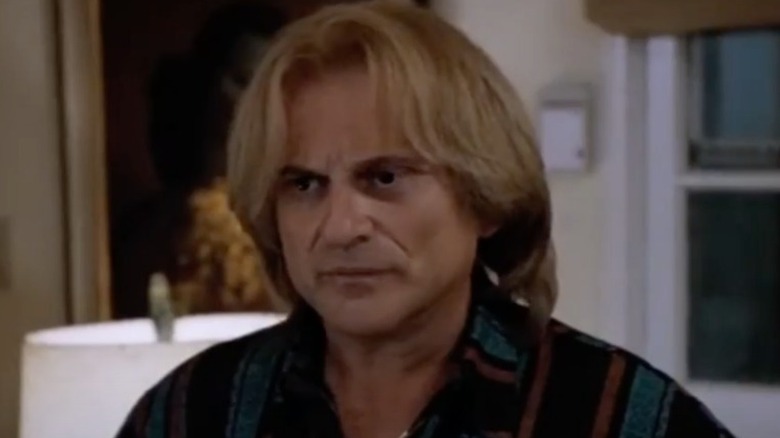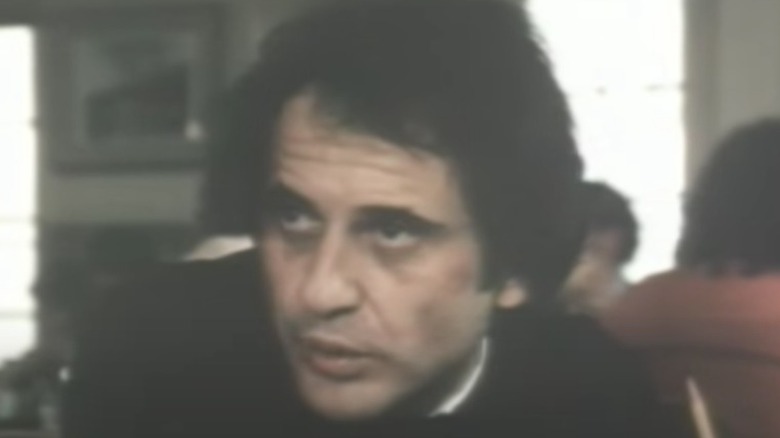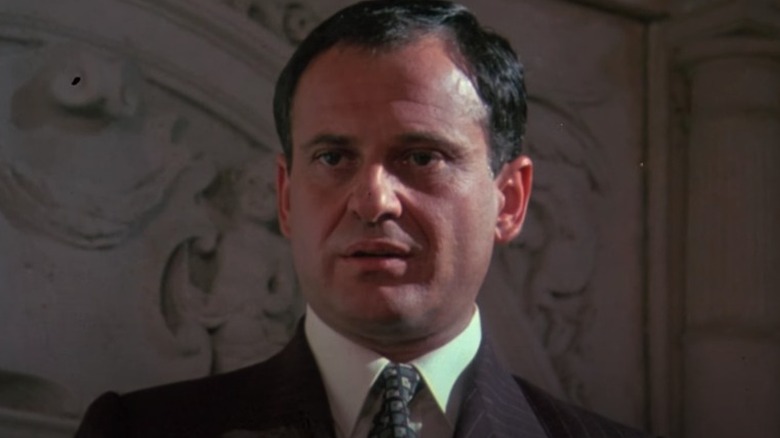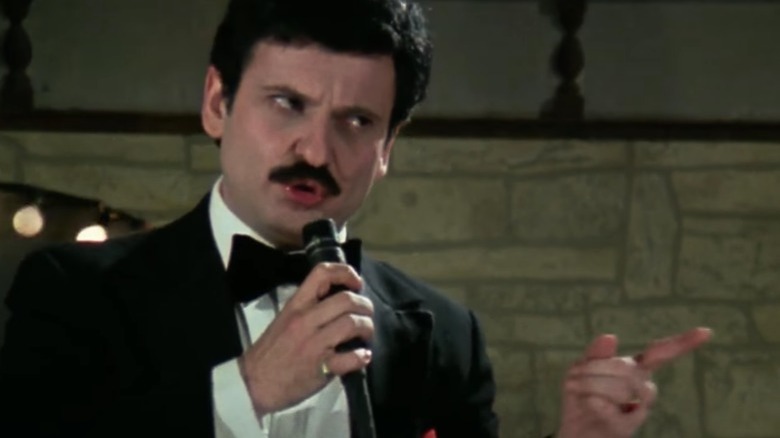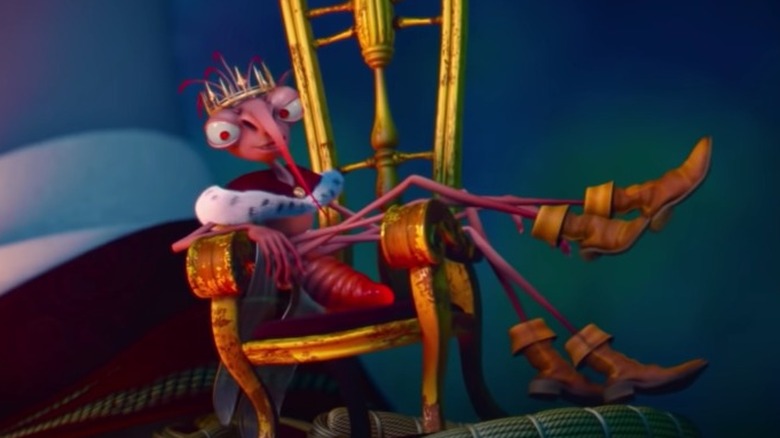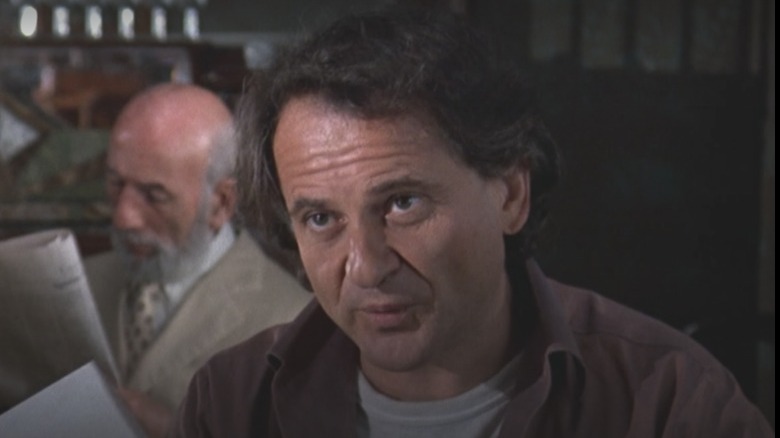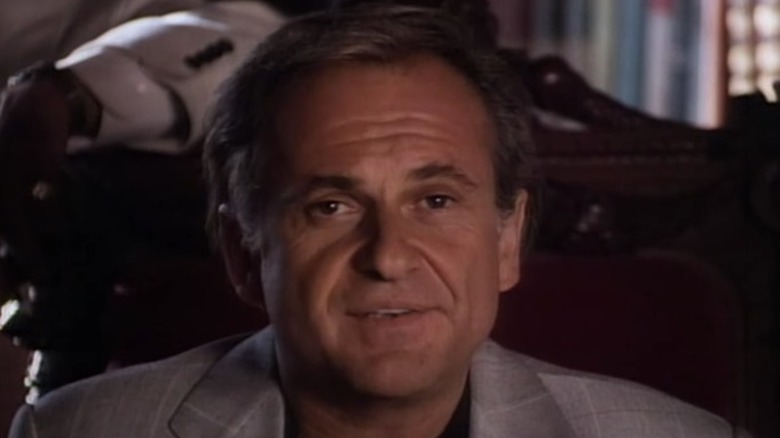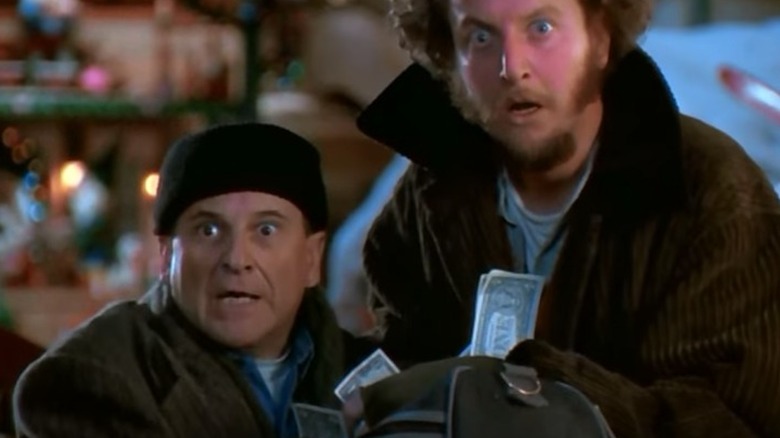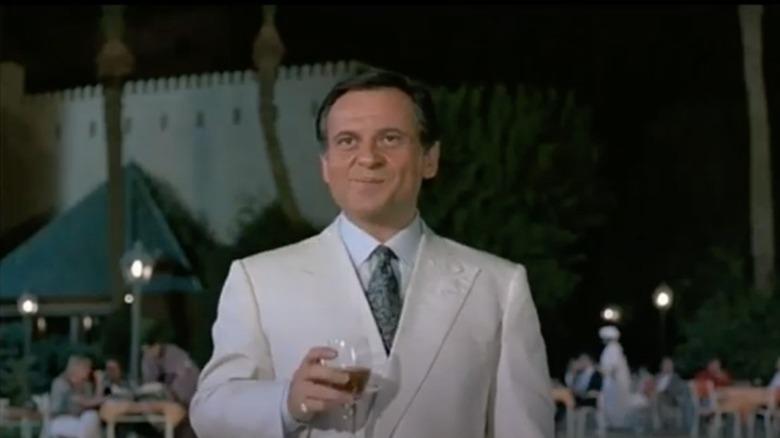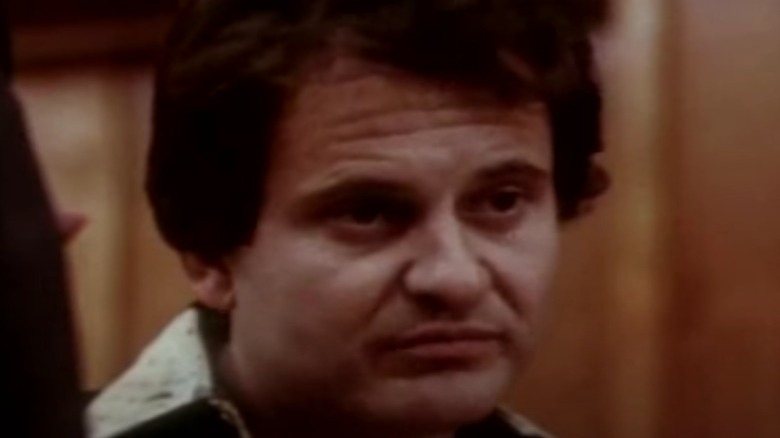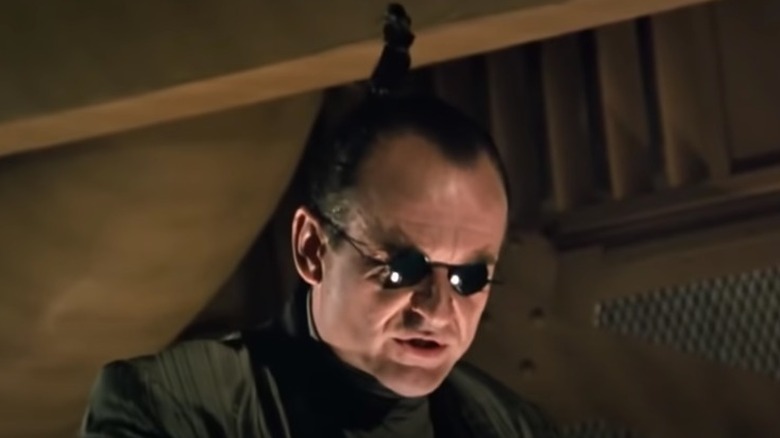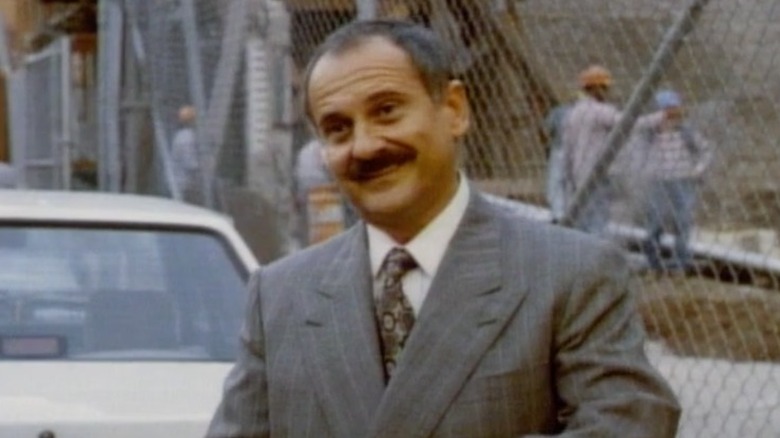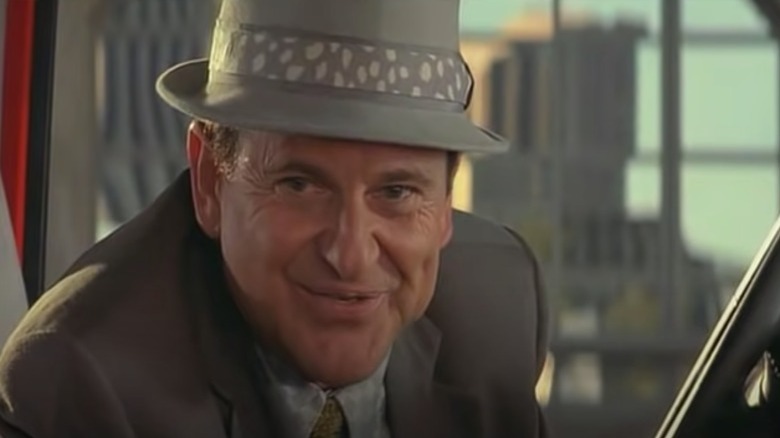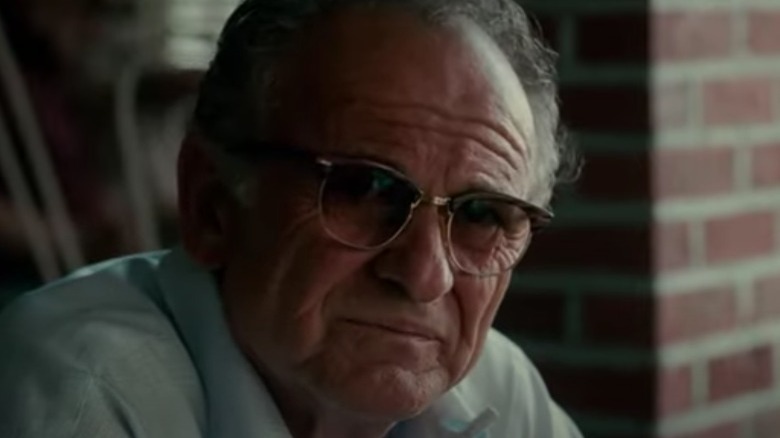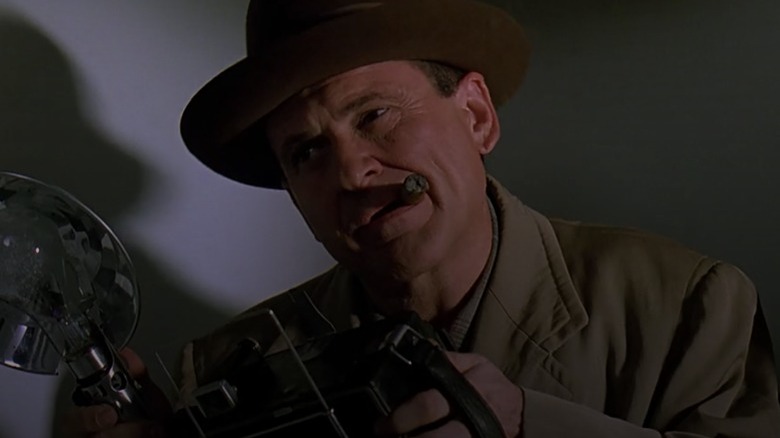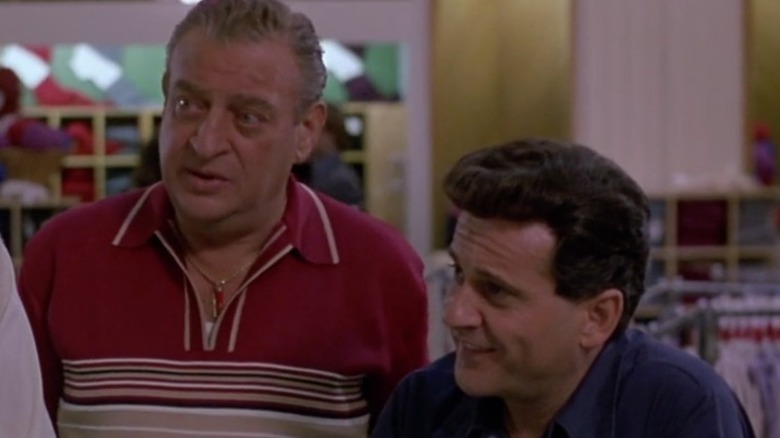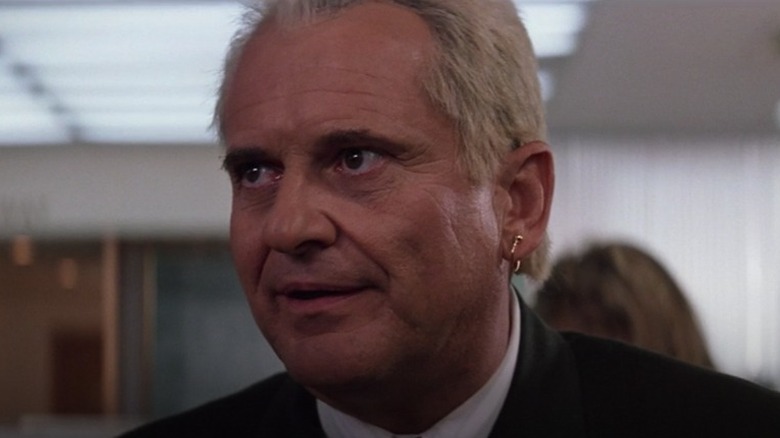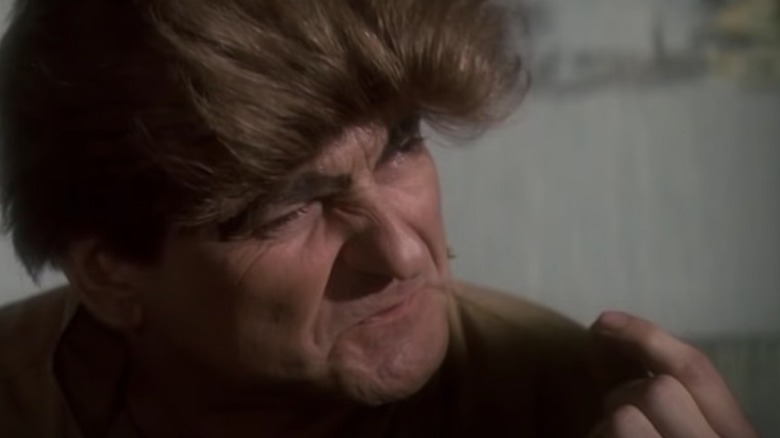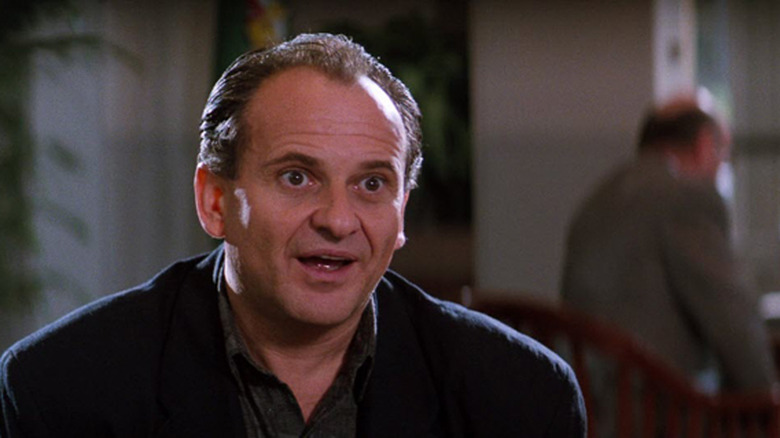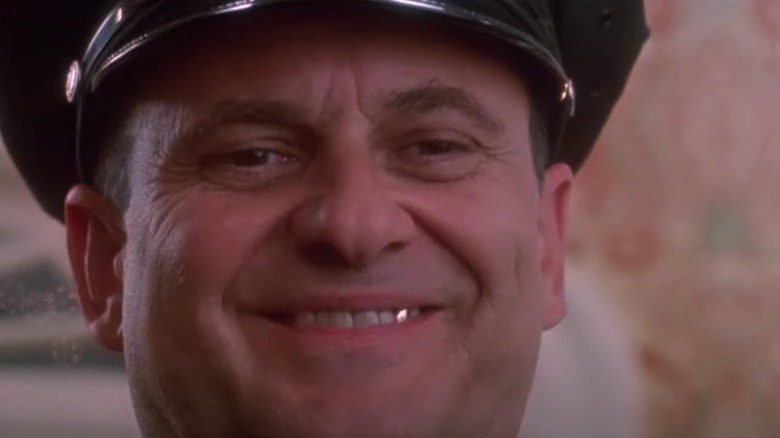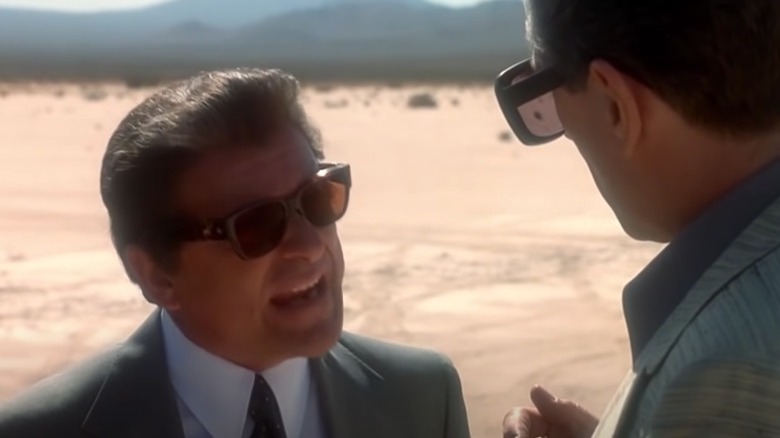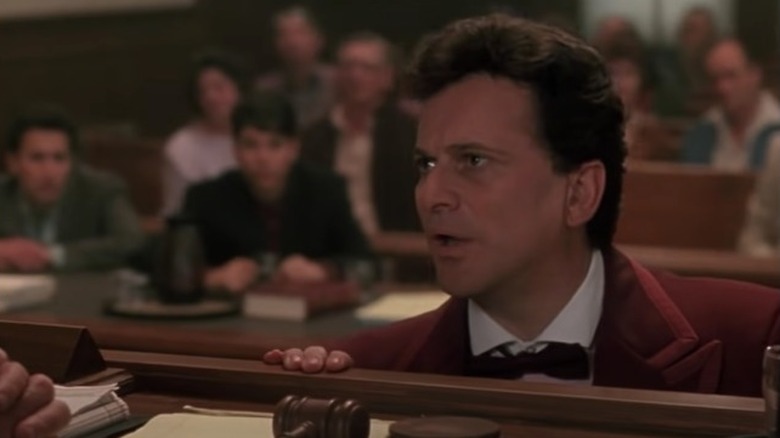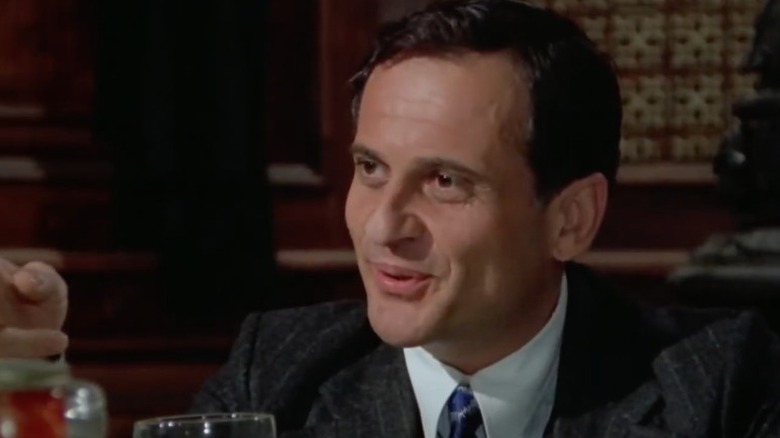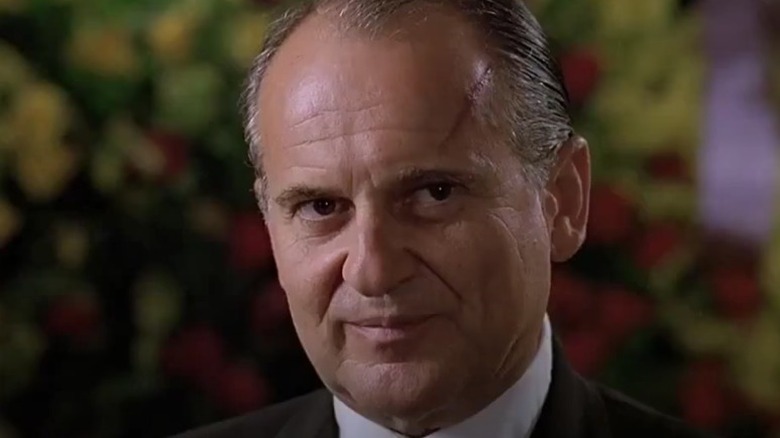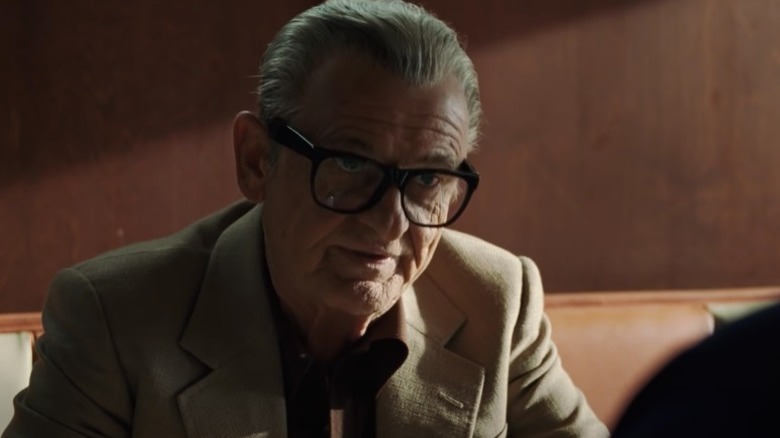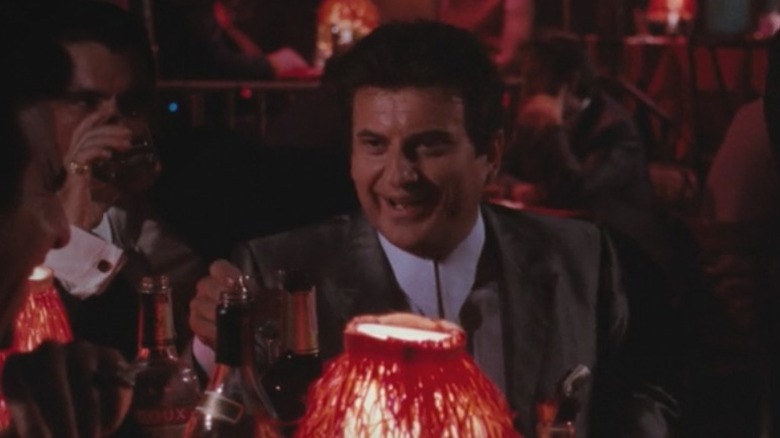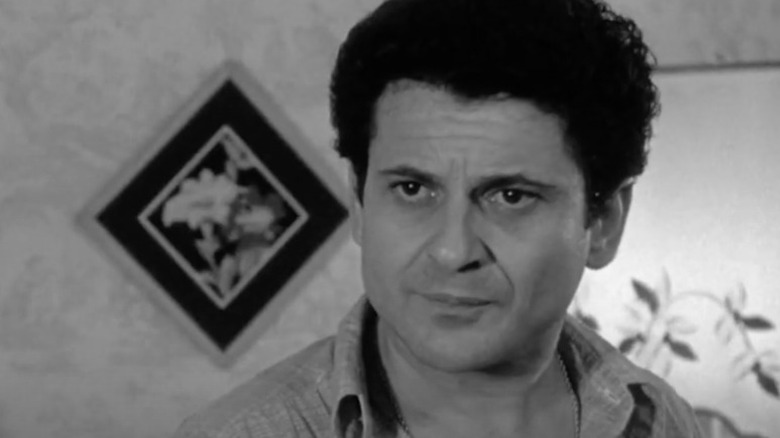Every Joe Pesci Movie Ranked Worst To Best
Joe Pesci is one of the most talented and distinctive American actors of the 20th century and beyond. From lowbrow comedies to buddy-cop romps to searing gangster epics, viewers rarely forget a Joe Pesci performance, even if the movie is kind of a stinker. Given his heavyweight dramatic chops on the silver screen, it's easy to forget Pesci began his showbiz career as a musician and vaudeville-style comedian in the 1960s. A sharp-eyed Robert De Niro spotted him in a minor movie role in the mid-'70s and Joe Pesci has been a ubiquitous and beloved cinematic presence ever since.
Let's celebrate his storied career by ranking his films from worst to best because every Pesci film, even the bombs, deserves a second look.
32. The Super
"The Super" is a film that is anything but. Joe Pesci stars as Louie Kritski, a New York City slumlord whose main preoccupation is flaunting his generational wealth and collecting rent from the tenants of his family-owned ramshackle apartments. The buildings, owned by Louie's father Big Lou (Vincent Gardenia), are in disrepair. Kritski's only concern is cash flow, the welfare of his tenants be darned. As punishment for his neglect, in lieu of prison time, a judge sentences Louie to stay in one of his units until he brings it back up to code. Louie thinks his father will bail him out, but Big Lou resists spending money on improvements. While Louie remains stuck in his apartment, he gets to know the building's residents, gradually becoming sympathetic to their plight. Louie confronts his father for his callous neglect and the building is refurbished.
"The Super" has a 0% on Rotten Tomatoes' Tomatometer, with criticism of the film having more to do with the screenplay and direction rather than with Pesci's performance. Roger Ebert writes of Pesci, "...he's squat, energetic, utterly confident, unselfconscious and essentially warm-hearted," noting that "he deserves a better screenplay than this one" and "he deserves better direction" than that of Rod Daniel.
31. Gone Fishin'
A literal fish-out-of-water story, "Gone Fishin'" stars Joe Pesci and Danny Glover as two buddies from New Jersey who win a fishing trip in the Florida Everglades, getting reeled into some serious trouble along the way. Joe (Pesci) and Gus (Danny Glover) get their car stolen by Martin (Nick Brimble), who turns out to be Dekker Massey, a criminal on the run. Joe and Gus find a blood-stained knife, possibly used by Massey, and plan to turn it in to authorities, but not until they finish their fishing trip. Joe happens to find a map that leads to Massey's secret treasure, and their pursuit of a big catch turns into a search for Massey's fortune. Aided by Rita (Rosanna Arquette), the daughter of one of Massey's victims, and her friend Angie (Lynn Whitfield), Joe and Gus find the treasure and capture Massey. Their reward for apprehending Massey mostly goes to pay for all the damage that Joe and Gus caused on their adventure.
The Critics Consensus on Rotten Tomatoes for the film is harsh, calling it "sloppy [and] formulaic" and noting that "'Gone Fishin” marks a painful low point in the careers of its two talented leads." The film is also an early screenwriting credit for J.J. Abrams, who went on to write and direct much bigger and better Hollywood films. Tragically, "Gone Fishin'" might be best remembered for an on-set accident rather than for Joe Pesci's acting. Stunt woman Janet Wilder died in a boating accident while filming a scene for the film (via Orlando Sentinel).
30. 8 Heads in a Duffel Bag
"8 Heads in a Duffel Bag" centers around, yes, eight severed heads in a duffel bag. Joe Pesci totes around the titular piece of luggage as Tommy Spinelli, who is hired by two hitmen, Benny (Joe Basile) and Rico (Anthony Mangano), to bring the heads to their boss as proof of a job well done. Unfortunately for Tommy, his bag full of heads gets switched with that of a bumbling medical student, Charlie (Andy Comeau), who is on his way to a Mexican vacation. Charlie and his girlfriend, Laurie (Kristy Swanson), discover the swap and try to get rid of the bag, but Laurie's father (George Hamilton) gets arrested due to his alleged association with heads. Meanwhile, Tommy works with Charlie's friends Ernie (David Spade) and Steve (Todd Louiso) to replace a head lost by Charlie. With their heads not arriving at their intended destination, Benny and Rico head to Mexico to collect the heads themselves, with plans to kill Tommy if they don't cross the border. Tommy and Charlie work together to thwart Benny and Rico. With everyone's futures secured, Tommy can kick back and enjoy retirement.
Heads certainly roll in "8 Heads in a Duffel Bag," but the violence was condemned by critics who called the film "sheer torture, the very definition of unfunniness itself" (via Washington Post). Pesci shines in an otherwise misguided comedy that aims for zaniness but lands on cringe. His performance is praised as the best part of the film, with the other cast members not meeting his level of acting (via RogerEbert.com).
29. Love Ranch
"Love Ranch" is based loosely on the true story of Joe and Sally Conforte, the Mustang Ranch, and the murder of boxer Oscar Bonavena. The Mustang Ranch is Nevada's first legal brothel (via Reno Gazette-Journal) and the film fictionalizes Joe, Sally, and Oscar's romantic and business entanglements. Joe Pesci plays Charlie Bontempo, the owner and operator of the Love Ranch brothel along with his wife, Grace (Helen Mirren). Charlie gets a contract to manage boxer Armando Bruza (Sergio Peris-Mencheta), but has Grace act as his manager due to his prior criminal convictions. Armando moves to the Love Ranch to live and train, eventually falling in love with Grace. Armando also wants to partner with Grace in running the Love Ranch. Threatened in both his personal and professional life, Charlie kills Armando.
At the time of its release in 2010, Mirren was most famous for her Oscar-winning performance as Queen Elizabeth II in "The Queen." She plays brothel madame Grace with the same steely reserve as she did the famed British monarch, albeit ruling over notably different realms. Pesci leans into the Italian-American tough-guy persona that has carried so many of his past roles. Despite two great actors giving fine performances, "Love Ranch" can never decide what kind of film it wants to be (via A.V. Club). The Hollywood Reporter even calls the film, which is about prostitution, "anti-erotic."
28. With Honors
Perhaps the most memorable part of the film "With Honors" is the Madonna song "I'll Remember," which reached number 2 on the Billboard Hot 100 chart in 1994 (via Billboard). The movie, however, is a middling comedic drama about the unlikely friendship between stuffy Harvard University student Monty Kessler (Brendan Fraser) and Simon Wilder (Joe Pesci), an unhoused man sheltering in the library boiler room. Simon, who finds himself in possession of Monty's senior thesis, will return it to Monty one page at a time in exchange for lodging. Though starting out as adversaries, Monty and Simon grow close, helping each other with their respective problems. Their friendship becomes so tight that academically driven Monty jeopardizes his thesis in order to reunite Simon, whose health is deteriorating, with his estranged son, Frank (Daniel Blinkoff). The reunion fails, but Monty stays by his side until Simon's death.
"With Honors" juxtaposes lessons learned in ivory towers to those cobbled together on the streets with such predictable ease that Roger Ebert asked the question, "Did it occur to the filmmakers to introduce one or even two new ideas into this material?" Pesci's Simon imparts life lessons to the Harvard scholars with ABC Afterschool Special energy, his world-weary wisdom existing merely to open the hearts of Monty and his privileged peers.
27. Jimmy Hollywood
Joe Pesci plays Jimmy Alto in "Jimmy Hollywood," the story of an unemployed actor desperately waiting for his big Hollywood break. With a backlog of almost-had-it acting roles, Jimmy takes up vigilantism for attention, with his friend William (Christian Slater) taping his exploits to send to local TV stations. Jimmy plays "Jericho," the leader of his S.O.S vigilante group, a role that makes him more famous than any television guest-starring acting stint ever could. A media circus ensues, leading Jimmy away from his craft and into the world of '90s tabloid infamy.
"Jimmy Hollywood" captures the gritty grind of Hollywood Boulevard that lies beyond the sound stage. Jimmy is a dreamer, a schemer, and one of many would-be actors toiling away in the town's underbelly, a respected acting career always just out of reach. Pesci, with his bleach-blonde hairpiece and casually unbuttoned patterned shirts, is "convincingly steeped in the sun-baked California craziness" (via New York Times). However, the film's melancholy meditation on fame and showbusiness doesn't mix with its comedic ambitions, with Variety noting, "As comedy, the sound of silence where laughs were meant to be weighs heavily throughout."
26. I'm Dancing as Fast as I Can
Joe Pesci makes a brief appearance in the drug addiction drama "I'm Dancing as Fast as I Can." The movie is based on the memoir of TV producer Barbara Gordon, who struggled to maintain her successful career and personal life while in the grips of a painkiller addiction. With her latest documentary film facing intense criticism by both her creative collaborators and the film's subject, Jean (Geraldine Page), Barbara (Jill Clayburgh) copes by sinking deeper into her addiction until she decides to quit. Leaving Valium behind cold turkey causes Barbara to deteriorate. Derek (Nicol Williamson), her live-in boyfriend who is dealing with his own drinking problem, decides the best way to deal with Barbara is to physically and emotionally abuse her. Barbara is eventually institutionalized, where she works with psychiatrist Julie Addison (Dianne Wiest) to beat her addiction. Aided by Julie and encouraged by Jean, Barbara recovers and completes her documentary.
Pesci plays Roger, one of the patients at Barbara's treatment facility, his character serving to highlight how far Barbara has fallen from her once-glamorous life. Apparently for Barbara, hitting rock bottom means, among other things, being subjected to a crass joke about Uranus by a relative stranger. When TV Guide says the best thing about "I'm Dancing as Fast as I Can" is the cinematography by future action film director Jan de Bont, it's probably in Pesci's best interest that his role was a minor one.
25. Eureka
"Eureka" director Nicholas Roeg loosely interprets the real-life murder of Sir Harry Oakes as a twisted metaphysical journey into unchecked wealth, depravity, and greed. Gene Hackman plays Jack McCann, a prospector based on Oakes, who strikes gold and becomes extremely wealthy. Jumping forward in time, the film finds Jack living on his own Caribbean island with his daughter Tracy (Theresa Russell) preparing to marry socially ambitious Claude (Rutger Hauer). Not only does Jack have to deal with a future son-in-law harboring possibly nefarious motives, but also Miami mobsters led by Mayakofsky (Joe Pesci), who want to build casinos on his island. Ruthless in their pursuit of this end, the mobsters kill Jack in a gruesome fashion. Claude witnesses the crime and is arrested for Jack's murder, but because there are so many people with possible motives to commit the crime, Claude is acquitted. He leaves the island with his now-wife Tracy. Jack's murder remains unsolved.
Pesci's performance is understated compared to the more bombastic elements of "Eureka." The movie is full of grotesque violence and explicit scenes that make even the most adventurous cinephile squirm. The New York Times accuses "Eureka" of falling victim to its own "fancy," the film ultimately done in by pretentious dialogue and gratuitous camera angles.
24. Dear Mr. Wonderful
Joe Pesci takes the lead in the German film "Dear Mr. Wonderful." In his first starring movie role, Pesci plays Ruby Dennis, a bowling alley owner whose heart lies in his lounge singing aspirations. Following Ruby and his dreams of making it big in Las Vegas while the struggles of his business and family life ground him in reality, "Dear Mr. Wonderful" is a "film that offers an artfully meandering view of working-class life in Newark and New York City" (via New York Times).
Pesci "makes a credible and touching Ruby, and he doesn't sing badly at all" (via New York Times). In real life, Pesci has a legitimate career as a singer, being a player on the music scene since the '60s. While not a great movie by any stretch of the imagination, "Dear Mr. Wonderful" gives Pesci a fine showcase for his musical talent.
23. Savva (A Warrior's Tale)
An embarrassingly ugly animated film from Russia, "A Warrior's Tale" was harshly panned as "execrable trash," "not funny," and not "attractive to look at" (via The Guardian). But such a poorly conceived film managed to rope in high-profile voice actors. The movie follows Savva (Milla Jovovich) on his quest to save his village from hyenas, who plan to capture and sell villagers to Mom Jozee (Whoopi Goldberg). White wolf Anggee (Will Chase) offers to take Savva to a magician, where he will find a fabled warrior destined to save the village. Savva, Anggee, and a group of companions they meet along the way face a series of challenges before finding the magician's home. Once there, Savva discovers he is the warrior he's been looking for, thus saving his village from the hyenas.
Joe Pesci shows up as the voice of the Mosquito King, the permanent companion to a cursed baron. The Mosquito King gets his moment of heroics, commanding a swarm of fellow mosquitos against a group of aggressive monkeys. Despite this opportunity to shine, Pesci's voice work is as uninspired as the animation. One hopes that Pesci, and all the actors hired for the English dub version, were paid handsomely for their troubles.
22. Man on Fire
1987's Italian action-thriller "Man on Fire," the first film adaptation of A.J. Quinnell's novel of the same name (the second adaptation being released in 2004), follows Creasy (Scott Glenn), a down-and-out ex-CIA agent hired as a bodyguard by a wealthy family to protect their daughter, Samantha (Jade Malle). Creasy, hardened by the violent memories of his past, forms a friendship with young Samantha, softening his demeanor. When Samantha is kidnapped by the mafia, Creasy vows to not only safely return Samantha, but to exact revenge upon the kidnappers. Creasy's former partner, David (Joe Pesci), provides him with the illegal weaponry to take on his new enemies.
"Man on Fire" is a film with a split personality. The first half tenderly centers around the growing friendship between Creasy and Sam. Then, after Sam's kidnapping, it turns into a violent shoot-'em-up affair. Pesci's David serves as a comic relief of sorts, leaning into his Italian-American screen persona. The attempted levity of Pesci's performance doesn't mesh well with "Man on Fire's" serious action movie tone.
21. Catchfire (Backtrack)
Dennis Hopper's film "Catchfire," also known as "Backtrack," is a scramble of ideas that don't quite make an omelet. In the film, artist Anne (Jodie Foster) inadvertently witnesses a mob murder overseen by Leo (Joe Pesci). Anne goes on the run after mobsters try to kill her while successfully murdering her boyfriend, Bob (Charlie Sheen). Mob boss Lino (Vincent Price) hires skilled hitman Milo (Dennis Hopper) to finish the job that the other mobsters couldn't complete. Even after she starts her life over, Anne is pursued by Milo. When he finds her in New Mexico, he promises he'll let her live if she does what he says. Secretly, Milo has fallen in love with Anne, and she eventually falls in love with him. Knowing that the mob still wants Anne dead, Milo must confront Leo and his henchman in order to be free to pursue their love.
The film's production was mired in problems, mainly due to the conflict between Jodie Foster and Dennis Hopper. Foster reportedly admitted that she found it difficult to work with Hopper (via Hollywood 411). Hopper renounced his director's credit, going by the pseudonym "Alan Smithee" in the credits (via Time Out). Like Hopper, Pesci distanced himself from "Catchfire" so much so that the role of Leo remains uncredited. Despite the cast's negative experience with "Catchfire," the film wasn't panned outright, with the Los Angeles Times calling it "a surprisingly good gangland thriller."
20. Home Alone 2: Lost In New York
"Home Alone 2: Lost in New York" is the sequel to the wildly popular 1990 film "Home Alone," which grossed almost $500 million at the global box office (via Box Office Mojo). The McCallister family takes another family holiday and Kevin McCallister (Macaulay Culkin) boards the wrong plane, finding himself in New York City instead of Miami. Armed with his father's credit card and a Talkboy recording device, Kevin scams his way into a room at the luxurious Plaza Hotel, but is chased away once his fraud is discovered. The Wet Bandits, Harry (Joe Pesci) and Marv (Daniel Stern), just happen to be in New York as well, and they plan to rob Duncan's Toy Chest toy store on Christmas Eve. They also just happen to run into Kevin, who learns of their plot and decides to stop them. Armed with an arsenal of booby traps and gadgets, Kevin thwarts Harry and Marv's robbery and they are arrested once again. Kevin is reunited with his family, and the McCallisters celebrate Christmas together.
"Home Alone 2: Lost in New York" plays out like its predecessor, taking the same comedic beats and placing them in a new location. Pesci and Stern make formidable comic foils for Culkin, but their performances are near-duplicates of those in "Home Alone." Culkin is slightly older in "Home Alone 2," making Kevin's propensity for violence less precocious and more sadistic. "Home Alone 2" did not impress critics, with the Rotten Tomatoes Critical Consensus calling it "a less inspired facsimile of its predecessor."
19. Tutti dentro (Everybody in Jail)
From acclaimed Italian filmmaker Alberto Sordi comes the comedy "Tutti dentro," released globally as "Everyone in Jail," a film that takes on the corruption of the Italian courts system for laughs. Sordi plays Annibale Salvemini, an honorable magistrate who wants to weed out the root causes of corruption in his jurisdiction. For all his moralizing and esteem, Salvemini actually has a secret pact with American mobster Corrado Parisi (Joe Pesci) to not sentence Parisi's crew to jail. "Tutti dentro" riffs on the political and legal climate of the '80s, which, as TV Guide notes, "may account for a twisted ending that lets most of the 'accused' off the hook." Joe Pesci is typecast yet again as Italian-American wiseguy. There's a reason why Pesci plays mafiosos so frequently: he's rather good at it. In "Tutti dentro," Pesci's smooth physicality exudes the confidence one would expect from a transcontinental criminal, a formidable foe to Sordi's exuberant Salvemini.
18. The Death Collector
Joe Pesci made his screen debut in the 1976 B-movie "The Death Collector." Jerry Bolanti (Joe Cortese) is just out of jail and in need of a job. He finds one through his mafia connections as a debt collector for wiseguys. Bernie Feldshuh (Frank Vincent) doesn't take too kindly to his own collection attempt by Jerry, so he hires an assassin, Marley (Keith Davis), to take Jerry out. On another job, Jerry teams up with seasoned debt collectors Joe (Joe Pesci) and Serge (Bobby Alto), but their success is short-lived when Marley kills Joe and Serge, taking off with their money. Jerry is accused of taking the money by his boss, Tony (Lou Criscuolo), and Jerry eventually tracks down Marley, the real thief, and kills him. Unfortunately for Jerry, just when things are looking up in his life, he's whacked by Tony.
"The Death Collector" was Pesci's big Hollywood break. While the movie itself is low-budget and deeply unremarkable, Robert De Niro saw "The Death Collector" and recognized Pesci and Vincent for their performances (via New York Times). Both Pesci and Vincent landed roles in "Raging Bull," which moved their careers to the next acting echelon.
17. Moonwalker
Michael Jackson's "Moonwalker" strings together disparate music narratives to create an imaginative, yet baffling, film experience. Broken into thematic segments, "Moonwalker" journeys from a live Michael Jackson concert, to a career retrospective, to Jackson having a dance-off with a Will Vinton-designed claymation rabbit (the movie was released in 1988 at the height of California Raisin-fever). Joe Pesci plays Frankie "Mr. Big" Lideo, the villain in "Smooth Criminal" who wants to hook the world on drugs, starting with children. Michael, joined by his child friends Katie (Kellie Parker), Sean (Sean Lennon), and Zeke (Brandon Quintin Adams), must evade Mr. Big after he discovers Michael and Katie spying on him. To escape Mr. Big, Michael and the gang hide in Club 30s. There they watch Michael perform his classic song "Smooth Criminal." Mr. Big finds them and attempts to kill Michael and Katie, but Michael turns into a giant robot and then a spaceship, defeating Mr. Big. Yes, this all happens in "Moonwalker."
Pesci clearly understood the assignment and hams it up, fleshing out the role of Mr. Big by wearing high-heeled boots, tiny sunglasses (which he wears in the dark), and a pointy topknot bun. The earnestness of "Smooth Criminal" veers the segment into camp, and Pesci seems more than happy to help make Michael Jackson the clear hero. "Moonwalker" wasn't released in American theaters and only received a home video release (via Los Angeles Times), perhaps a smart move for a movie of loosely strung-together music videos.
16. Besty's Wedding
Written and directed by Alan Alda, "Betsy's Wedding" has the making of a great romantic comedy, but the laughs don't come together. Alda plays Eddie Hopper, a Long Island contractor whose daughter Betsy (Molly Ringwald) is getting married to Jake (Dylan Walsh). Eddie, short on cash, wants to throw a lavish wedding for Betsy to impress Jake's parents. Eddie, with the help of his brother-in-law, Oscar (Joe Pesci), secures financing with some mafia-esque strings attached. Meanwhile, wiseguy Stevie Dee (Anthony LaPaglia) falls for Eddie's other daughter, police officer Connie (Ally Sheedy). Family squabbles about Betsy's nuptials resolve themselves, the wedding happens, and everyone can move on with their lives.
"Betsy's Wedding" is notable for its squandering of acting talent. Supporting actors Madeline Kahn, Burt Young, and Pesci are given little to do in the film. Pesci's wiseguy Oscar is merely a utility player, serving to move the film's plot forward. Critics observe that the actual wedding storyline isn't the best part of the film, it's the Connie/Stevie Dee romance, with the Los Angeles Times charmed by LaPaglia's "100% pure, freeze-dried Robert De Niro" performance.
15. Lethal Weapon 4
The "Lethal Weapon" movie quadrilogy wraps up with 1998's "Lethal Weapon 4." LAPD cop buddies Riggs (Mel Gibson) and Murtaugh (Danny Glover) deal with feuding Chinese triads and corrupt Chinese generals, who are using counterfeit money to resolve their problems. At the same time, they're managing personal dramas centered on pregnancies: Riggs is expecting a child with Lorna (Rene Russo) and Murtaugh's daughter Rianne (Traci Wolfe) is having a baby with LAPD Detective Butters (Chris Rock). Joe Pesci returns as Leo Getz, now a private detective, and helps Riggs and Murtaugh bust Wah Sing Ku (Jet Li) and his criminal factions.
"Lethal Weapon 4" is full of "gratuitous violence and stunts, some quite spectacular, all resolutely meaningless" (via Washington Post). Variety notes that the movie works "because its heroes are so darn buoyant and charming." Gibson and Glover's on-screen chemistry floats the film amid its choppy plot and gratuitous violence. Pesci, a staple of the franchise since "Lethal Weapon 2," takes Getz's loud-mouth, obnoxious energy to new heights but also delivers a surprisingly poignant monologue about friendship. Here, Pesci gives emotional depth in a film that's not really asking for it.
14. The Good Shepherd
Joe Pesci took an eight-year break from acting between 1998's "Lethal Weapon 4" and 2006's "The Good Shepherd." Who else but Robert De Niro could bring Pesci back to the screen? De Niro's second directing credit, the film is the fictionalized origin story of the Central Intelligence Agency as recounted by CIA agent Edward Wilson (Matt Damon). Wilson's journey starts at Yale University, where he is recruited by General Bill Sullivan (Robert De Niro) into the Office of Strategic Services. While in London with the OSS, Wilson learns the intelligence ropes. After World War II, his attention turns to Soviet–focused espionage. His son Edward Jr. (Eddie Redmayne) becomes a CIA agent too, with tragic personal consequences.
Pesci only appears in one scene in "The Good Shepherd." As crime boss Joseph Palmi, a composite of real-life mafiosos, his brief dialogue with Damon's Wilson is meant to question the moral efficacy of the CIA. Is Palmi's association with organized crime any worse than Wilson's at the CIA? Palmi refutes Wilson's offer to ease government pressure through CIA cooperation by saying, "You're the guys that scare me. You're the people that make big wars."
13. The Public Eye
In "The Public Eye," Joe Pesci stars as Leon "Bernzy" Bernstein, a 1940s New York City tabloid photographer inspired by real-life shutterbug Arthur "Weegee" Fellig (via New York Times). Nobody can take a picture like Bernzy, and he builds his reputation by zooming around the city in a car containing a makeshift darkroom in the trunk. But Bernzy also wants to be taken seriously, with ambitions to elevate his street photos into high art. When Bernzy meets widow nightclub owner Kay Levitz (Barbara Hershey), whose husband left her with mob trouble, he decides to help her out, falling in love with her in the process. In his pursuit of helping Kay, Bernzy gets framed for murder and uncovers a secret war between the mob involving the federal government. And in the end, he doesn't get the girl.
"The Public Eye" puts Pesci in leading man territory and Roger Ebert praises him for giving a "great juicy movie performance," but others note the lack of chemistry between Pesci and Hershey (via New York Times). Bernzy gives Pesci an opportunity to branch out from his usual portrayal of violent gangsters and mafiosos. Bernzy is scrappy and street smart, but he's also tender-hearted. "The Public Eye" was a box office disappointment (via Box Office Mojo), but was an acting triumph for Pesci.
12. Easy Money
Rodney Dangerfield reaches for some respect in the film "Easy Money," playing a working-class schlub who could inherit $10 million if he cleans up his act for a year. As stipulated in the will of his wealthy mother-in-law, department store magnate Mrs. Kathleen Monahan (Geraldine Fitzgerald), Monty Capuletti (Dangerfield) must quit his boozing, smoking, and gambling ways in order to receive the inheritance. If he doesn't, his family gets nothing. Changing his lifestyle, while seemingly easy, proves to have its challenges. Mrs. Monahan's nephew, Clive Barrow (Jeffery Jones), undermines Monty's health journey so he can get the $10 million, and his drinking and gambling buddies are more interested in placing bets on Monty's possible failure. But with the encouragement of his family and his best friend Nicky (Joe Pesci) by his side, Monty reforms and gets the money. The twist, though, is that Mrs. Monahan faked her death so Monty would become respectable. The additional twist is that while Mrs. Monahan thinks she's succeeded, Monty's secretly boozing it up with his bros.
"Easy Money" is for Rodney Dangerfield lovers. The movie is just a tug-of-the-necktie short of being a feature-length Dangerfield routine, but he manages to flesh out Monty enough to give him extra dimension. According to the Washington Post, the movie is "not what you'd call a classic or a class comedy act, but it has the kick of an embryonic pop phenomenon." Pesci plays it sincerely as Nicky, staying grounded in his bachelor plumber ways while Monty fantasizes about his potential wealth, adding another great supporting role to his resume.
11. Lethal Weapon 3
The formidable buddy-cop team of Riggs (Mel Gibson) and Murtaugh (Danny Glover) teams up again in "Lethal Weapon 3." In this installment of the action movie franchise, Riggs and Murtaugh, the latter of whom is on the brink of retirement, are assigned to track down former LAPD cop Jack Travis (Stuart Wilson), who is running an arms-smuggling ring. Working with internal affairs Sergeant Lorna Cole (Rene Russo) and getting assistance from money-laundering, federal-witness-turned-realtor Leo Getz (Joe Pesci), Riggs and Murtaugh blow up a lot of stuff, beat up a lot of bad guys, and kill Travis. In between explosions, Riggs and Cole squeeze in a budding love affair and Murtaugh has a change of heart, deciding to stay with the police force.
Getz is a polarizing character; you either delight in his hyperactivity or recoil from it. The New York Times praised Pesci's Getz, but slighted the film, saying he's "funnier than his material." Yet TV Guide observed Pesci must "have been asked by director Richard Donner to parody his already farcical performance" from "Lethal Weapon 2."
10. JFK
Oliver Stone's "JFK" delves deep into the assassination of President John F. Kennedy. Examining the events leading up to Kennedy's death and the alleged conspiracy to cover it up, "JFK" weaves together historical facts and dubious speculation into one epic cinematic event. Kevin Costner stars as attorney Jim Garrison, a real-life investigator into JFK's assassination and prosecutor of businessman Clay Shaw (Tommy Lee Jones), the only person brought to trial for Kennedy's death. Garrison spends years piecing together his investigation, with his findings leading him to a possible high-level government plot to keep the truth of Kennedy's death a secret.
Joe Pesci plays David Ferrie, a private pilot linked by Garrison to the JFK assassination conspiracy. In "JFK," Garrison looks into the link between Lee Harvey Oswald (Gary Oldman), Ferrie, and Shaw. Ferrie dies under suspicious circumstances, but not before he confirms to Garrison that there indeed was a conspiracy to kill Kennedy.
"JFK" was nominated for eight Academy Awards, a recognition of its filmmaking mastery, with "Stone's savvy, documentary-style black-and-white footage cast[ing] an aura of truth over this theoretical treatise" (via Hollywood Reporter). Pesci's brief yet intense portrayal of Ferrie is "solid, yet unsurprising" (via BBC), but most of the performances in "JFK" are merely factoid vessels in Stone's "sea of information and conjecture" (via rogerebert.com).
9. Lethal Weapon 2
The sequel to the buddy cop classic film "Lethal Weapon," "Lethal Weapon 2" proves that "if you liked 'Lethal Weapon,' you'll like ”Lethal Weapon 2” (via New York Times). Mel Gibson and Danny Glover return as Riggs and Murtaugh, two LAPD cops who are now investigating murderous, drug-smuggling South African diplomats. Riggs and Murtaugh, reassigned from their investigations after warnings from their targets, are ordered to protect informant Leo Getz (Joe Pesci), an accountant to criminal elements who skims from his clients. Riggs and Murtaugh link Getz's money laundering activity to the South Africans, leading back to council-general Arjen Rudd (Joss Ackland), the same diplomat who requested Riggs and Murtaugh be removed from their initial investigation. Rudd's diplomatic immunity can't save his drug money or his life, as he is taken out by Murtaugh.
"Lethal Weapon 2" has action, laughs, and a puzzling amount of allusions to The Three Stooges. The addition of Pesci's Getz is just the refreshment this sequel needs, with Roger Ebert praising Pesci as "movie's most memorable character." The movie grossed over $200 million at the global box office upon its release in 1992 (via Box Office Mojo), making it popular enough to spawn two more sequels, with Pesci back for both.
8. Home Alone
The family comedy blockbuster "Home Alone" remains a holiday classic decades after its release. Macaulay Culkin's portrayal of precocious Kevin McCallister launched him into superstardom. Kevin is banished to the attic by his mom, Kate (Catherine O'Hara) for misbehaving on the eve of their family Christmas vacation to Paris, and he's accidentally forgotten there. For Kevin, it's cause for celebration; for Kate, it's sheer panic; for The Wet Bandits, it's perfect. The Wet Bandits are Harry (Joe Pesci) and Marv (Daniel Stern), a bumbling criminal duo who've targeted the McCallister house for a heist. They think the house is empty, but Kevin's home, and he doesn't want visitors. Setting a series of elaborately violent booby traps, Kevin stops Harry and Marv, who are arrested for their crimes. Kate, after an arduous journey, makes it home, reunited with Kevin just in time for Christmas.
"Home Alone's" absurd comedic violence didn't endear itself to critics. Indeed, the New York Times critic went into an existential crisis in their review, noting that "very awfulness of these antics — a nail through a foot, a face stamped with a red-hot iron, a character's hair burned off the top of his head — is what makes them so riotous, at least from a small child's point of view." Pesci's Harry, whose hair is burnt off by a blow torch, is just menacing enough to create genuine fear in kids. He's also goofy enough to withstand the brutal punishment of Kevin, striking the perfect tone for a children's movie villain.
7. Casino
Robert De Niro, Joe Pesci, and director Martin Scorsese reunite for their third film together in 1995's "Casino." Based on the book "Casino: Love and Honor in Las Vegas," "Casino" is a fictionalized re-telling of organized crime's involvement in 1970s Las Vegas. De Niro stars as Sam "Ace" Rothstein, a sports handicapper sent to Las Vegas by the mob to run the Tangiers Hotel. Joe Pesci plays Sam's childhood friend, mob enforcer Nicky Santoro, who is sent to Las Vegas to keep the Tangiers Hotel operation in line. Running the Tangiers is not easy for Sam. Sam works to please his mafia bosses while appeasing corrupt local officials. The FBI eventually catches wind of skimming at the Tangiers, starting an investigation. All the while, Sam's hustler wife Ginger (Sharon Stone) can't shake her abusive ex-boyfriend Lester Diamond (James Woods) and seeks solace by starting a relationship with Nicky. The FBI eventually closes the casino, and Nicky, whose reckless violence has become a liability to mafia bosses, gets killed and buried in a cornfield.
Visually dazzling, "Casino's" soft-focus excess weaves an epic tale of Las Vegas' past, filled with glitz, glamor, and pastel polyester pantsuits. De Niro, Pesci, and Stone give fine performances, with Stone earning an Oscar nomination for her efforts. But for De Niro and Pesci, "Casino" seems like a rehash of old material. Pesci's Nicky is a light retread of his performance in "Goodfellas," which didn't go unnoticed by critics, who noted while intriguing, it was not surprising (via Variety).
6. My Cousin Vinny
With a "terrific" performance by star Joe Pesci, "My Cousin Vinny" proves that "you can take the guy out of Brooklyn but not Brooklyn out of the guy, even in Alabama" (via Hollywood Reporter). When New Yorker college students Bill Gambini (Ralph Macchio) and Stan Rothenstein (Mitchell Whitfield) get arrested in Alabama for crimes they didn't commit, they reach out to Bill's cousin Vinny (Joe Pesci), a lawyer, for help. He's an inexperienced attorney, but he's family, so he'll do. Accompanied by his flashy fiancée, Mona Lisa Vito (Marisa Tomei), Vinny goes to Alabama for the trial. What Vinny doesn't have in courtroom experience, he makes up for in his street smarts. Surprisingly, Mona Lisa saves the day with her expert witness testimony about cars, her knowledge honed over the years by living with a family of car mechanics. The charges against Bill and Stan are dismissed, and Vinny and Mona Lisa move toward (possible) wedded bliss.
Putting a fresh spin on the fish-out-of-water story trope, "My Cousin Vinny" delights, with Pesci and Tomei's fun on-screen chemistry taking center stage. Pesci goes full-Brooklyn as Vinny, complete with a tight black t-shirt, leather blazer, and tacky gold necklace. Pesci's Vinny is also a welcomely divergent take on his well-honed "wiseguy" screen persona. He's not in the mob, but Vinny definitely turns out to be wise.
5. Once Upon a Time in America
"Once Upon a Time in America" is director Sergio Leone's sweeping epic tale of the decades-long friendship between Jewish New York City gangsters and the potential for tragedy within the American Dream. David "Noodles" Aaronson (Robert De Niro) and Maximilian "Max" Bercovicz (James Woods) grow up together, forming a street gang and then becoming successful bootleggers during Prohibition. When booze becomes legal again, their enterprise crumbles, leading to a desperate robbery attempt that kills several of their gang, including Max. Noodles goes into hiding, and decades later, he unravels the truth about the botched heist. In "Once," Joe Pesci plays crime boss Frankie Monaldi with gritty authenticity.
Originally a six-hour film, "Once Upon a Time in America" was highly divisive upon its release, receiving a 15-minute standing ovation at its premiere out of competition at the Cannes Film Festival while also being called the worst movie of the year by American critics (via Esquire). U.S. audiences saw a highly edited cut of the film when it was released in 1984, a version that pleased no one, including Leone (via Vanity Fair). A 2012 restored, extended "Once" gave reason to reassess the film, with the New York Post declaring, "adding 22 minutes to 'Once Upon a Time in America' only enhances Leone's brilliant saga of guilt and betrayal."
4. A Bronx Tale
Joe Pesci plays a small yet pivotal role in "A Bronx Tale." The movie is the coming-of-age story of Calogero ("C"), an Italian-American boy torn between the straight-laced life of his bus driver father Lorenzo (Robert De Niro) and the exciting danger of mafioso Sonny (Chazz Palminteri). At age 9, C witnesses a mob murder and keeps quiet about it, earning the respect and mentorship of Sonny, but Lorenzo warns him to stay away from wiseguys. As the years pass, C secretly maintains his relationship with Sonny. Social changes also come to the neighborhood. Moving into 1968, C falls in love with Jane (Taral Hicks), a Black girl he meets on his father's bus. Racial tensions between Italian-Americans and African-Americans run high and C and Jane are caught in the middle. Sonny, still protective of C, saves his life, but C can't save Sonny's. Carmine (Joe Pesci) pays his respects at Sonny's funeral when C notices a scar on his head. Sonny had saved Carmine's life during a fight witnessed as a child. Carmine offers C help when, and if, he needs it.
"A Bronx Tale" is critically beloved, with a current 97% on the Rotten Tomatoes Tomatometer. While it doesn't break new ground, it's praised as "appealing in its celebration of ambiance and mood" (via Los Angeles Times). The Washington Post is fine with its conformity, stating, "If 'Bronx Tale' feels too familiar, it's at least the familiarity of good Italian movies." Pesci's understated Carmine is a device to show C's growth, proving sometimes worn character tropes can serve a purpose.
3. The Irishman
Based on the provocative true-crime book, "I Heard You Paint Houses: Frank 'The Irishman' Sheeran and Closing the Case on Jimmy Hoffa," Martin Scorsese's 2019 organized crime saga "The Irishman" is so epic that it brought Joe Pesci out of retirement. Never mind that the stories told by Sheeran have suspect credibility, because "The Irishman" stands as one of Scorsese's great filmmaking endeavors. Robert De Niro plays Frank "The Irishman" Sheeran, a union truck driver who allegedly killed labor leader Jimmy Hoffa (Al Pacino). Unfolding over a series of decades, "The Irishman" weaves Sheeran's story together with that of Russell Bufalino (Joe Pesci) and Hoffa's, starting with Sheeran acquiring "house painting" work from Bufalino. After being introduced to Hoffa by Bufalino, Sheeran and Hoffa become close, with Sheeran eventually becoming Hoffa's bodyguard. The authorities scrutinize Hoffa's ties to the mafia and when he's stripped of his power, Hoffa decides to break the Teamsters away from organized crime. Now a liability, Hoffa is ordered to be killed by the mafia dons. They pick Sheeran to be the hitman. Sheeran takes out Hoffa, his body cremated in secret.
Pesci is a "revelation" in "The Irishman," with the New York Times observing he "does everything with his sad, watchful eyes and his lovely, walnut-shell face. When he and De Niro are onscreen together, you believe in the power of art." The BBC said Pesci "gives the film its chilling core." Pesci was nominated for the Best Supporting Actor Oscar at the 92nd Annual Academy Awards for his efforts. Not too bad for an actor who had all but left the business.
2. Goodfellas
Playing short-fused, psychopathic gangster Tommy DeVito in Martin Scorsese's gangster opus "Goodfellas" is a career high-water mark for Joe Pesci. "Goodfellas" paints a tapestry of mafia life that is both violently terrifying and luridly banal. Henry Hill (Ray Liotta) narrates his journey from aspiring mafioso to protected government witness with cool detachedness. Hill can never truly be an insider; his father is Irish, so he can never be "made" and will always be at arm's length from true mafia power. Embraced by local capo Paulie (Paul Sorvino) and befriended by Jimmy Conway (Robert De Niro) and Tommy DeVito, life is good for Henry until Tommy kills "made" gangster Billy Batts (Frank Vincent) in a fit of blind rage. Soon, Henry turns to drug dealing to support his family. Pushing cocaine is lucrative for Henry, so much so that he brings Jimmy and Tommy in on the deals. But betrayals after the Lufthansa heist and comeuppance for Batt's death catch up with them, leaving a trail of suffering and death. Disowned by Paulie and fearing for his family's life, Henry becomes an informant. As Henry says at the end of the film, "Everything was for the taking, and now it's over."
Pesci won a well-deserved Academy Award for Best Supporting Actor for the role, his callously violent portrayal of Tommy being rooted in his real-life observations. Tommy's volatile rage captivates and terrifies, his primal instinct for self-destruction a cautionary tale for unchecked impulses. Pesci's performance is a major reason why "Goodfellas," even decades after its release, "remains the greatest depiction of mobster life on screen" (via BBC).
1. Raging Bull
Heralded as one of the greatest movies of all time, "Raging Bull" is "one of the bloodiest and most beautiful reflections on atonement in the Scorsese canon" (via Los Angeles Times). Robert De Niro, in an Academy Award-winning performance, plays middleweight boxer Jake LaMotta, a deeply insecure man whose sexual jealousy proves to be his undoing. Joe Pesci is Joey LaMotta, his supportive brother/manager who struggles in vain to modulate Jake's propensity for self-loathing and personal destruction. Jake dukes it out in the ring against some fierce opponents, but it's his paranoia surrounding his second wife, Vickie (Cathy Moriarty), that ultimately takes him down for the count. Pesci earned his first Best Supporting Actor Oscar nomination for playing Joey. Roger Ebert observes that "Pesci's performance is the counterpoint to De Niro's, and its equal."
The raw violence in "Raging Bull" and its deeply unlikeable protagonist can make even the most hardened moviegoer squeamish, yet the movie continues to be lauded for its deeper examinations of the human condition. "Raging Bull" and its poetic brutality, beautifully captured in black-and-white cinematography, is also a meditation on masculinity, with TV Guide noting the film's violence "forces you to consider its place in the male identity — it's easier for most men to retreat into than honest emotion."
